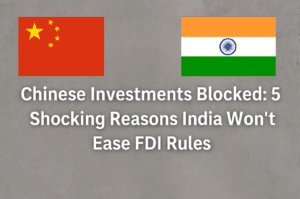Chinese Investments Blocked: 5 Shocking Reasons India Won’t Ease FDI Rules
The Indian government is unlikely to relax its current restrictions on Chinese investments, despite increasing pressure from private sector players and policy commentators. These curbs were tightened in 2020 following the COVID-19 outbreak and the military standoff in Ladakh, leading to bans on Chinese apps and restrictions on government procurement. Authorities remain deeply concerned about the opaque ownership structures of Chinese firms and their ties to the Chinese state and military.
Additionally, China’s non-market practices—like heavy subsidies and loan write-offs—are viewed as giving unfair advantages to its businesses. While some argue that collaborating with China, particularly in technology, could benefit India, the government remains cautious. India’s Press Note 3 policy mandates case-by-case approval for investments from countries sharing land borders, giving the government flexibility in decision-making. This rule has already been used to block large deals, such as BYD’s $1 billion joint venture plan. Officials also suspect some of the lobbying to ease FDI rules may be driven by Chinese firms whose expansion plans have been stalled.

Chinese Investments Blocked: 5 Shocking Reasons India Won’t Ease FDI Rules
The Indian government shows no signs of easing its tight restrictions on Chinese investments, despite growing calls from businesses and experts to revisit the rules. Officials remain cautious about allowing unchecked capital flows from China, especially as global trade dynamics continue to shift. The U.S.-China trade tensions under former President Donald Trump—raising concerns about Chinese goods being redirected to Indian and Asian markets—have only heightened India’s wariness about opening its doors to Chinese money.
These stringent policies were introduced in 2020 during the COVID-19 pandemic, following deadly border clashes between Indian and Chinese troops in the Ladakh region. In response, India banned over 200 Chinese apps, imposed visa restrictions on Chinese nationals, and barred Chinese firms from participating in government contracts. While private industry has been urging Prime Minister Narendra Modi’s government to reconsider—arguing that collaboration with China in sectors like technology could strengthen India’s ability to navigate global challenges—the administration has remained firm.
At the core of the government’s hesitation are ongoing concerns about Chinese companies. Authorities cite opaque ownership structures, close ties to the Chinese government and military, and unfair economic practices. For instance, Beijing’s support for its industries—through subsidies, debt write-offs, or state-backed financing—gives Chinese companies an advantage that Indian officials view as inconsistent with fair-market competition. These concerns have overshadowed industry appeals to ease foreign direct investment (FDI) norms, even in areas where Chinese expertise might benefit India.
A major barrier for Chinese investors is India’s “Press Note 3” policy, which requires government approval for any investment from countries that share a land border with India. Although this rule technically applies to all neighboring countries, it is largely seen as targeting China. Critics argue that this red tape is undermining India’s goal of becoming a global manufacturing hub. For example, while India is actively courting multinationals like Apple to establish production bases, Chinese suppliers in Apple’s ecosystem face significant obstacles expanding their operations in India. In turn, China has reportedly retaliated by tightening the screws on these companies within its own borders, complicating their global operations.
This investment screening process also gives the Indian government significant control over which deals go through. A prominent case involved Chinese electric vehicle giant BYD, which proposed a $1 billion joint venture with Indian firm Megha Engineering to build EVs and batteries. The deal was blocked under Press Note 3, largely due to national security concerns. Notably, Megha Engineering was later linked to an unrelated political funding controversy, further reinforcing the government’s cautious stance.
Officials suspect that much of the current pressure to ease FDI restrictions stems from Chinese companies frustrated by their stalled expansion plans. Some have tried to circumvent the rules by transferring ownership to Indian partners, but these efforts have often failed to convince regulators, who remain alert to the risk of hidden influence from Beijing.
While some experts argue that selective collaboration with China could help accelerate India’s growth in tech and manufacturing, the government appears unwilling to take that risk. The memory of the Ladakh clash and China’s continued assertiveness over territorial claims still loom large, feeding a deep sense of mistrust. At the same time, India’s ambition to present itself as a democratic and transparent alternative to China in global supply chains has made it even more cautious about deepening economic ties with its neighbor.
For now, the Modi administration seems focused on attracting investment from other regions—such as the U.S., Europe, and Japan—while keeping Chinese capital at arm’s length. The message is clear: unless Beijing takes concrete steps to address transparency and fair-play concerns, India’s gates will remain firmly closed. As one official put it, “Why let in players who don’t follow the rules of the game?” This stance reflects not only economic pragmatism but also a broader geopolitical strategy, as India navigates an increasingly complex global landscape.
You must be logged in to post a comment.